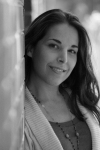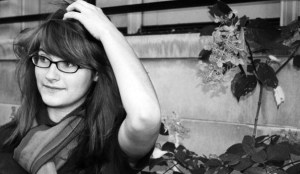Meet Kevin Brooks, Chief Marketing Officer at FoodLink, a 10-year old startup that provides supply chain software solutions to help growers, shippers and retailers in the fresh food  industry. The role takes Kevin into Salinas quite often — the heart of the U.S. produce industry and home to many of California’s most significant agriculture companies. On these trips, Steinbeck is never far from his mind, particularly as he gets to know both the immigrant farm workers as well as the powerful farming families and their agents. But don’t let Kevin’s title and software experience fool you. His toque, scarf, and beard are dead giveaways. Yep, we have a serious reader on our hands.
industry. The role takes Kevin into Salinas quite often — the heart of the U.S. produce industry and home to many of California’s most significant agriculture companies. On these trips, Steinbeck is never far from his mind, particularly as he gets to know both the immigrant farm workers as well as the powerful farming families and their agents. But don’t let Kevin’s title and software experience fool you. His toque, scarf, and beard are dead giveaways. Yep, we have a serious reader on our hands.
Who are you?
I’m a third generation San Francisco Bay Area native, liberally educated husband, father and lapsed musician now living and working in a Swiftian land of software engineers and venture capital. I share Shakespeare’s birthday (and deathday), and I spent the summer after graduating from college teaching barflies about Bloomsday and serving Manhattans to Chicago bookies laying low on an island in Lake Michigan.
Kindle, audiobook, or good, old-fashioned paper pages? Why?
The story matters more to me than the medium, although sometimes the two are relevant as with works like Watchmen or Tristram Shandy. I’m not a big fan of audiobooks. The visual of a word, sentence, paragraph is important to the shape of a story. With me, that story takes a beating because I’m rough on books, snatching a page or two in all sorts of places and usually in the stolen moments between business and family obligations. We don’t have a lot of storage space in our house so I tend toward digital these days.
What is the greatest treasure you’ve unearthed at a used bookstore? Describe.
Shortly after college in the pre-Internet years I was living in St. Paul, MN, and frequently on the lookout for something by the great Russian Futurist, Vladimir Mayakovsky. One grey winter day in a scruffy bookstore between used car dealerships not too far from one of the local colleges I found a great English translation Mayakovsky’s poems. The book proved eventful many years later as a conversation starter with the woman who later became my wife.
Is there a novel you dislike so intensely you’d like to will it out of existence?
That’s a bit extreme, although I suppose a case could be made for certain political or religious screeds. Even some of the dreadful old Soviet Socialist realism that I read back in Russian lit classes has its place (1,000 pages on a cement factory, anyone?).
What book do you put on the coffee table when you want to impress your guests?
At this point in my life I think a coffee table that doesn’t have my son’s toys all over it is fairly impressive – to me, at least. Impressive in this context would be William Steig’s original Shrek! — not that Disney dreck — featuring over-the-top prose such as this verbal assault on a hapless peasant standing in Shreck’s way: “You there, varlet! Why so blithe?”
What is your favorite unknown or under-appreciated book?
John Collier’s Fancies and Goodnightsnever fails to captivate people once I turn them on to it. It is a little gem of a story collection that covers a lot of ground, and most people have never heard of it.
What are three books you wish everyone would read? Why?
Joyce’s Ulysses, definitely. Pretentious? Perhaps, but it is basically the story of the English language crafted around the framework of a universal human theme: the struggle to return home. If you care at all about words, and even if much of it goes past you on a first read, Ulysses is a must. You emerge more attuned to the world. Cervantes’ Don Quixote also falls into this “must read” group. Arguably the first modern novel (written more than 500 years ago), you need to look past the entertaining yet simplified musical and go to the source. Long ago I had the opportunity to spend the day with the writer Carlos Fuentes, and he told me that Quixote is the foundation for most modern literature, and certainly for all Spanish language literature in the Americas. Even in translation, it is a marvel. And while Joyce and Cervantes are hefty, literary writers, I also think the sly genius of Eudora Welty in her collected short stories is something everyone should encounter. She is a master storyteller, stylist and close observer of people living among the troubled ghosts (brutal, humorous, proud, insane) of the American South. There are better Southern writers, but I know of none that have the range, creativity and compassion of Welty. As a bonus round (and not technically fiction), I think Gibbon’s The History of the Decline and Fall of the Roman Empire is essential for navigating many of the narratives of our modern world with a sense of sanity, perspective and wonder. Although published during the extraordinary year of 1776, I was surprised how readable I found the language and how thoroughly it transcended its time and subject matter.
What novel should replace the Gideon’s Bible in hotel rooms worldwide?
John Kennedy Toole’s A Confederacy of Dunces. An astonishing picaresque, posthumously discovered in a drawer and full of the kind of dark mirth to which all travelers can in some way relate.
Is there a book that’s been raved about by many, even by people you respect, but just didn’t get what all the fuss was about, even to the point of questioning your own literary standards?
Interesting question. It is perhaps a sad testament to the literary standards of Silicon Valley that unless the subject matter involves Steve Jobs, people out here rarely discuss, let alone rave about books. A few years back I read Jennifer Egan’s widely praised A Visit from the Goon Squad. I don’t know what it is about books that pivot around aging rock stars or fans, but the construct always strikes me as Baby Boomer nostalgia. Which is fine, but just not my cup of tea.



 Posted by Kevin Neilson
Posted by Kevin Neilson 






